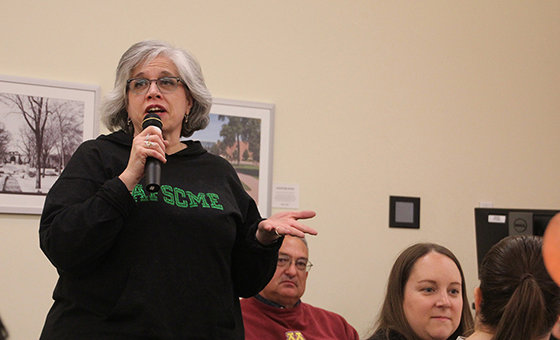 Theresa St.Aoro is a renter in the Como neighborhood. She loves the duplex she rents and the neighborhood, and would only move if her rent increases too much. She wishes there was less volatility in rent prices. (Photo by Tesha M. Christensen)
Theresa St.Aoro is a renter in the Como neighborhood. She loves the duplex she rents and the neighborhood, and would only move if her rent increases too much. She wishes there was less volatility in rent prices. (Photo by Tesha M. Christensen)By TESHA M. CHRISTENSEN
tesha@monitorsaintpaul.com
Bringing the voice of renters into city hall is a subject Ward 4 Council Member Mitra Jalali Nelson is passionate about.
She is a renter who campaigned on a platform of renter’s rights last summer before being elected to the seat vacated by Russ Stark. On Thursday, April 18, she held a Renter’s Voice Summit in partnership with five district councils.
“Half of our community is renting and we have yet to see full representation [on the city council],” Nelson pointed out.
She added, “Tenants are the most diverse group of residents. What are our rights? What are ways to make our voices heard?”
Nelson pointed out that this is the first time an event of this kind for renters has been organized. “We are doing something new and different,” she said. “I believe our government needs to work directly with folks to solve problems.”
CONVERSATION BETWEEN LANDLORDS AND RENTERS
Renters, landlords and district council members attended the April 18 summit at Hamline University, and talked about the divide that exists between homeowners and tenants.
“There is the perception that homeowners are somewhat permanent and part of the city, and that renters are transient,” observed District 10 Community Council Executive Director Michael Kuchta after his group had chatted together. “Yet there were renters at our table who have lived in the neighborhood longer than I’ve owned my home.”
At the Hamline Midway Coalition table, landlords expressed concerns about how to manage challenging tenants, and asked to be part of the process in developing a single application. Tenants and landlords are concerned about requirements by the city department of safety and inspection and don’t feel that they are clear.
Union Park residents are anxious about how the new stadium will affect rental prices.
They also want to see renters voices reflected in news articles.
Those at the Mac-Groveland table pointed out that there are good landlords who genuinely want to hear about issues so they can fix them and seek to have good relationships with those who are leasing from them. These small business owners may also live in the building they own or nearby.
District council members encouraged people to get involved in their organizations in order to make change happen and bring their voices to the table. “I encourage folks who are renting to be part of this work,” said Hamline Midway Coalition Community Organizer Melissa Cortes Michener.
Nelson told those gathered that the night’s meeting was only one of many steps.
“The conversation needs to continue,” stated Nelson. “We need the relationships in this room to help us reach more people.”
 Photo by Tesha M. Christensen
Photo by Tesha M. ChristensenOTHER CITY INITIATIVES
At the council level, Nelson is working on a fair housing and tenant protection ordinance.
In December 2018, the Saint Paul City Council approved a one-time $10 million and annual $2 million investment into a Housing Trust Fund, for total housing investments of over $71 million. The aim of the Housing Trust Fund is to produce, preserve, and protect housing affordability for St. Paul residents and to address the current crisis of housing affordability.
In February, the city’s Housing and Redevelopment Authority (HRA) approved using money from the Housing Trust Fund for the new 4(d) Affordable Housing Incentive Program. This will preserve existing affordable housing by providing landlords with a small property tax credit. Within the first two weeks, 104 applications for 721 units were received, including nearly 200 units serving households at or below 50 percent of area median income.
In the next year, the Housing Trust Fund will explore various programs, including a rent supplement pilot in partnership with St. Paul Public Schools, targeted down-payment assistance programs, and investments in proven models of sustained affordability and wealth building such as the Rondo Community Land Trust.
The Rental Rehabilitation Loan Program seeks to preserve existing affordable rental housing options. Landlords of 1-4 unit properties who want to upgrade their current property classification by making property improvements that increase the safety and quality of rental units can apply for a loan of up to $30,000 for 10 years at 0% interest to address eligible issues.
Other ideas discussed at the Renter’s Voice Summit include: Ban the box to help those with criminal records get rental housing, and just cause eviction. With a central application system, potential renters would just have to fill out one application form. Another idea would be to have a central list of available rental units.
If a right of first refusal was implemented, renters would get the option of buying the property first if it went up for sale.
At the start of the summit, speakers shared resources for renters. Free legal advice for rental problems is available at the Home Line, 612-728-5767 or email an attorney at www.homelinemn.org/email.
Rights for tenants fall under three main categories and make up the majority of calls the Home Line receives: security deposits, repairs and evictions.
• Landlords can charge a screening fee for applicants, but not if no rental units are available at the time of application or in the near future.
• At the end of tenancy, the landlord must return the deposit within 21 days with 1% interest, although they can keep any amount necessary with written explanation to make repairs to the damage done by the tenant.
• Rental agreements are either periodic (month-to-month) or for a definite amount of time. For periodic rental agreements, the landlord or the tenant can end the agreement at any time, but must give proper notice (either stated in the lease or one full rental period plus one day under state law).
• A landlord cannot raise the rent without written notice of one rental period plus one day for month-to-month leases, and unless the lease allows for increases for definite leases.
• Landlords cannot enter a unit without a reasonable business purpose (ex. showing the unit to other prospective tenants) and only after making a good faith effort to give you reasonable notice.
• Landlords are required to keep a unit in reasonable repair. You can file a complaint with St. Paul DSI by calling 651-266-8989 if they refuse to make repairs, or write the landlord and request repairs within 14 days. If management fails to make such repairs, you may file a rent escrow action.
• In order to legally evict a tenant, a landlord must first bring a formal court “Eviction Action,” (“unlawful detainer”) against the tenant, with a recognized legitimate reason under state law to do so. (These include nonpayment of rent, breach of the lease, holding over after a notice to vacate, or some specific illegal/criminal behaviors.) This is followed by a court proceeding that must then be carried out to completion.
• A landlord may not evict a tenant or end a tenancy in retaliation for the tenant’s “good faith” attempt to enforce the tenant’s rights (such as calling an inspector), nor can a landlord respond to such an attempt by raising the tenant’s rent, cutting services, or otherwise adversely changing the rental terms. If, within 90 days of a tenant’s action, the landlord starts an Eviction Action or gives the tenant a notice to vacate, the law presumes that the landlord is retaliating.
Information taken from a handout from the April 18 Renter’s Voice Summit. A full handbook with more detail and legal resources is available at bit.ly/MNTenantLandlordRights
Comments
No comments on this item Please log in to comment by clicking here